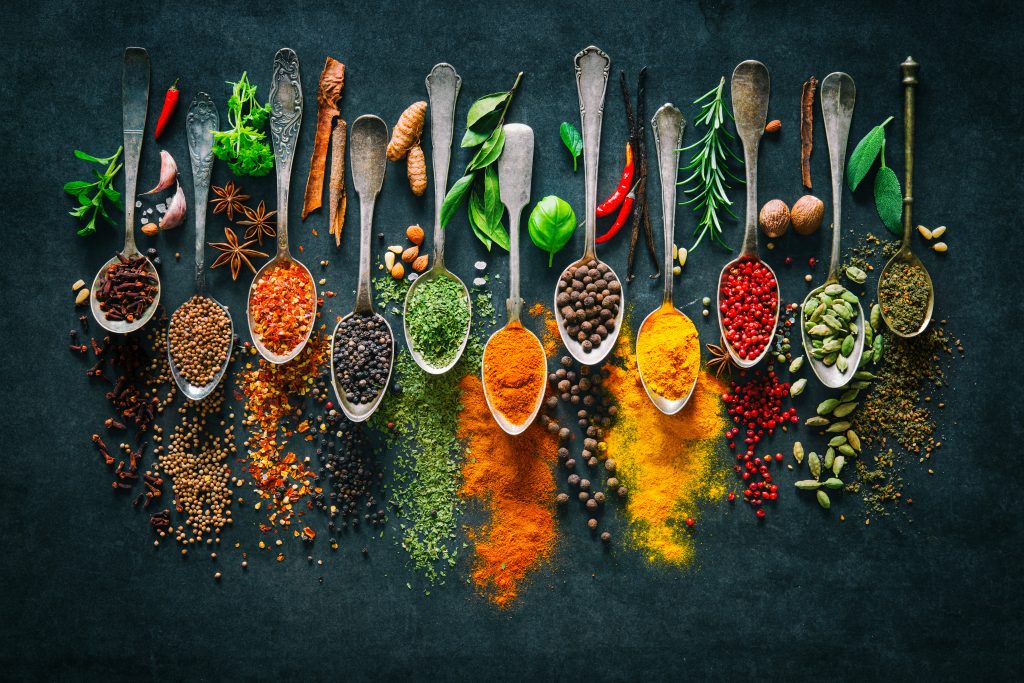
Held as a part of the Organic Digital Trade Week, an ongoing sister initiative to the Organic and Natural Products Expo, the Ingredients and Spices live webinar session showcased educational insights and market trends in the Middle East. The week was purposed towards connecting buyers from the region with global suppliers, facilitating multiple RFQs and inquiries. The Organic and Natural Products Expo is the only such trade event of its kind in the region.
The trend for organic and natural ingredients and spices segment is certainly looking up, especially post-COVID-19. Here’s what our experts have to say.
The ingredient market in the MENA region worth about USD 36 Billion

“The global spice market is expected to reach 520 million dollars by 2024, and a CAGR of 6.4% during 2019-2024,” starts Manisha Advani, Founder of Soul Santé Cafe, one of Dubai’s best hotspots for sampling vegan food.
“In the Middle East, we can see at least a 60% increase in the natural and healthy F&B industry over the years. As Dubai has more F&B outlets per million than New York, the overall potential is huge.”
Coming to the ingredients Market, Katarina Gjosheva Cheshlarov, founder of Midway Middle East, a major distributor of organic, gluten, vegan and non-GMO products in the region said, “The MENA region ingredient market alone is worth about USD 36 Billion and is expected to have CAGR growth of 4% to reach USD 45 Billion by 2025.”
Advani emphasized the UAE government’s role in encouraging both local production and imports, “One of the reasons why the organic industry is on an upward trend is because of government incentives. The local government is encouraging people to follow SDG goals for zero hunger. They are incentivizing local business owners in terms of awareness programs and also awarding innovation. The government is working on subsidizing categories, making imports easier as well.”
Rising demand for functional food ingredients
The pandemic has brought a shift toward healthy and functional food ingredients.
“There has been a rising demand for functional food ingredients. The increase in consumption of nutritive convenience food and the growth in health awareness among consumers is driving the functional food ingredients segment,” Cheshlarov shared. “The market is majorly driven by the rising demand for processed food products including various categories, such as ready meals, breakfast cereals, confectionery, and non-alcoholic beverages. The demand for convenient foods has recorded robust growth, owing to changing lifestyles and dietary preferences, which is, therefore, fueling the specialty ingredients market.”
“COVID-19 has genuinely caused a shift in the way people think and eat. I feel, post-pandemic, we would be seeing a 7-8% growth in this sector in the coming years,” Advani added.
Adam Ragab, General Manager of Bedaya General Trading, a specialized distributor of premium FMCG products, gave his opinion on the HORECA and retail segments.
“From a distributor’s perspective, we’ve noticed a shift in the HORECA sector, where they are using organic ingredients to differentiate flavors and also make the food healthier. For retail, people are looking for innovative solutions, health, and convenience,” he said.
Lokesh Aswani, Managing director of Down to Earth Organics, a speciality spices and ingredients retail chain commented, “In the retail sector, we have seen a drastic increase in the demand for organic, especially given the latest situation. People are conscious of what they are consuming.”
UAE, Saudi top importers of spices, turmeric, cardamom, cloves
“The Middle East has been a great consumer of spices. Even though the percentage of the population has been marginally lesser than the US and UK, the consumption pattern of spices has been far greater. The UAE and Saudi are top importers of spices, turmeric, cardamom, and cloves that are being brought in primarily from India and Madagascar. The fact that these markets also re-export makes them a major hub,” said Aswani.
Meanwhile, Ragab opined, “I always take the UAE as a pioneer in terms of the Middle East, and Saudi is one of the biggest markets that has seen a major interest in organic products. Interestingly, you will see new brands and innovative products giving consumers the convenience they are looking for.”
Turmeric is leading the health wave
Turmeric came up several times during our discussion as a leader in the pandemic era.
“Turmeric shots have become a superfood, and we’re going back to the basics. Spices have always seen adulteration, foul play, and deteriorating quality. Organic stands out in this sense from a health perspective,” Aswani shared.
Advani, a chef herself, stated, “People are on the lookout for vitamin or immunity-boosting food with ginger, lemon, and turmeric. Words such as vitamins, immunity, and vitality are important keywords that suppliers should use while marketing themselves, especially online.”
Coming to nutritional demands for children, Ragab gave his insights, “For children, schools might be looking at canceling the canteen, to avoid children gathering in one place. There might also be a move toward lunch boxes that will be delivered to the child’s desk, packed with nutrition, and labeled to educate the child on what they are eating.”
E-commerce is humungous and is going to continue to grow
Ragab is optimistic about e-commerce trends for the future, “Every consumer hopes to make their life experience more convenient. E-commerce is humungous and is going to continue to grow. It’s important to note how you deliver your products, where you’re getting them from, the consistency, quality, and sustainable packaging.”
Consumers are looking at organic plus ‘what else’
In today’s day and age, only organic is not enough. There has to be a special extra factor as per our experts.
Aswani said, “I would suggest doing a thorough study of the market, as one of the most challenging aspects in the UAE is that we are a hub for more than 100 nationalities, and the consumer market is very diverse and complex. Try out smaller batches first, then go into the market on a larger scale if successful. Go slow, go steady, and study the market.”
Manisha said, “You need to build on supplier relationships. Prices can only get you so far, so you should stand out with innovation and focus on sustainability.”
Adam said, “Why are you different? That’s what I look for in all suppliers. Your product needs to have a story, a goal, and a clear understanding of your effect on the planet. It’s all about organic and ‘what else’ you can provide from an environmental perspective.”
Expecting massive growth in the Middle East, specifically for immunity-boosting products
On his prediction for the future, Ragab commented “I see the organic label growing further, creating new categories of sustainable organic and more. I hope one day this will become the new normal.”
“I think the involvement and decision-making process of the consumer will increase. We will see a rise in organic biodynamic and sustainable products that make a difference,” said Aswani.
Advani, meanwhile, shared, “I believe that just saying organic won’t cut it anymore. Differentiating yourself based on taste and overall goal will help suppliers from a marketing perspective.”
Cheshlarov ended on a positive note as well, “In the past 5 years Global Organic F&B Market has been growing over 16% CAGR and it is expected to reach 330 Billion by 2024. There will be a dramatic increase in the demand for healthier products across the globe. I expect massive growth in the Middle East region taking into consideration the fast adaptation of western culture and COVID-impact, specifically for immunity-boosting products.”
